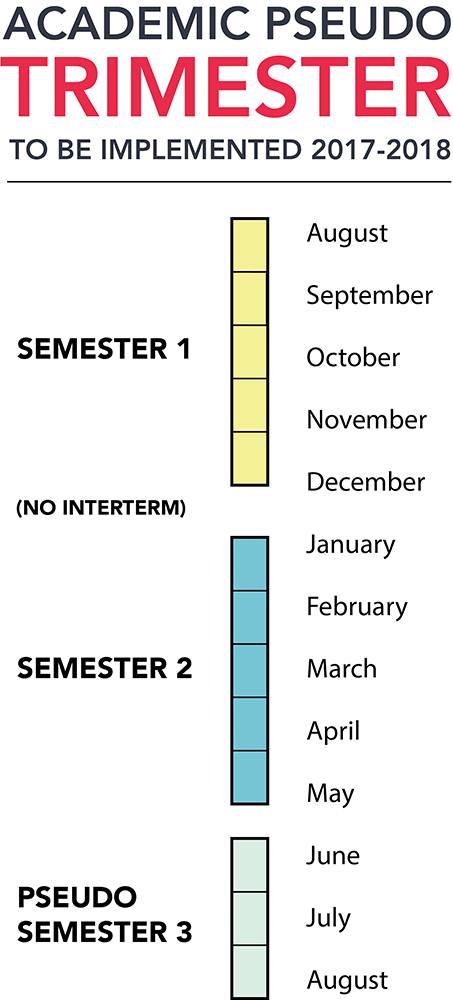Biola administration has decided to adopt a pseudo-trimester system for the 2017-2018 academic year.
A SMALLER WINTER BREAK
The new trimester system will yield a smaller winter break — potentially two or three weeks as opposed to the current six. Spring semester will end closer to the beginning of May, followed by a complete summer session that will allow students to complete more units toward graduate.
Finances play a pivotal role in the decision since students will now have the option to finish their education faster and save money. Biola’s grounds are upkept throughout the course of the year, and the funds will be better utilized since students will use campus facilities.
Also, administration will have the opportunity to efficiently organize different programs during times of the year apart from the fall and spring semesters since several programs like classes, missions trips and study abroad opportunities currently overlap and complicate students’ education process.
Matthew Hooper, associate dean of students and a member of the new calendar committee, spoke at last week’s senate meeting regarding the need for this academic calendar shift. Hooper stressed that the university is overlaying an online platform in which each semester, including summer, will include two online sessions that will be approximately seven weeks long.
ANTICIPATING CHANGES
Patricia Pike, vice provost for academic administration, explained how the deliberation over the new calendar development and what changes faculty and students can anticipate.
“We won’t have January interterm but we’ll have a longer summer,” Pike said. “More of [summer courses] will be online, so if students want to go home, get a job, work so that they can come back the next semester, they can also be taking an online course and fit it into their scheduling much easier than if you have to be in class half the day.”
Undergraduates will also see a full academic week shaved off the calendar, to the dismay of the faculty, Pike said.
“So students think ‘Okay so exams come up a week earlier.’ But for faculty, it’s like, ‘But I’ve got fifteen weeks of material, what do you want me not to teach? I can’t do that, I can’t short-drift my students like that,’” Pike said, “Essentially, every faculty member’s syllabus for every class will have to be re-arranged a little bit.”
THE BENEFITS
A significant benefit for non-traditional students is the dispersion of financial aid. Pike described the dispersion process as complicated, but worth understanding.
“The way financial aid works, you can only distribute financial aid over terms that are roughly equivalent lengths. So we can’t use financial aid for our summer term because it’s too short relative to our semester terms,” Pike said.
A longer summer term will fulfill the demands of financial aid distribution contracts. Currently, summer tuition is paid per unit at a lower rate than fall and spring semesters. Students taking 12 units or more during fall semesters pay twice as much per unit as summer session. Only students who receive at least half of their tuition in aid will be able to use financial aid for summer classes.
Getting out at the beginning of May will increase Biola’s competitiveness regarding student jobs and internships compared to Cal States and UCs, placing them on the same plane of other Southern California students, according to Hooper.
Administration desired for several people to be involved, well aware this decision would affect approximately 7,000 students, both graduate and undergraduate, and contacted the Student Government Association to collect their constituencies’ input.
“The idea of SGA is to represent the student voice. And right now, there are some big decisions being made,” said Drew Mattocks, vice president of SGA. “It’s cool that they’re coming to us and they’re really wanting to get the student voice before making the final decisions.”







